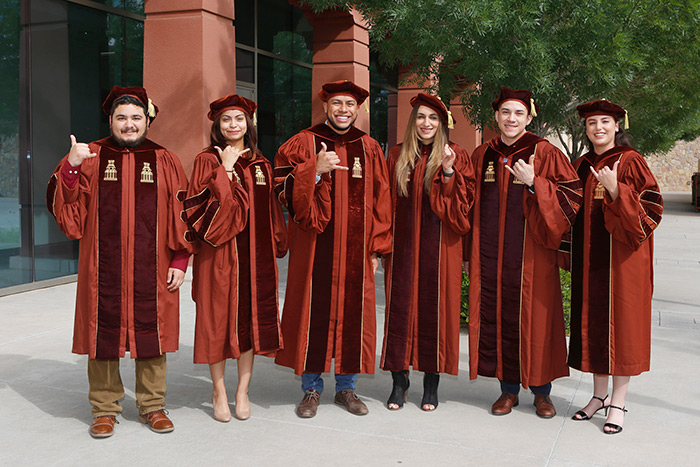UTEP Celebrates Last Cooperative Pharmacy Program Graduates
Last Updated on May 29, 2019 at 12:00 AM
Originally published May 29, 2019
By Laura L. Acosta
UTEP Communications
When her son was young, Erick Romero's mom would ask the neighborhood pharmacist for advice to treat a runny nose or an upset stomach.

Listening to the pharmacist patiently explain the difference in over-the-counter medications and their possible side effects to his mom inspired the young Romero to pursue a health care career.
“I wanted to be part of a health care team,” said Romero, a graduate of Bel Air High School’s Center for Health Professions program. “But I wanted to be more on the counseling side of it. For pharmacists, their specialty is to listen to patients and inform them about how to use their medications safely. That’s a good way to make an impact in the community.”
When Romero graduated from high school in 2013, The University of Texas at El Paso’s School of Pharmacy was four years away from opening. Rather than attend a pharmacy program outside of El Paso, Romero applied for the UTEP-UT Austin Cooperative Pharmacy Program’s (CPP) final cohort, and was accepted.
Between 1995 and 2019, the CPP created a pipeline for local aspiring pharmacists to obtain a Doctor of Pharmacy degree (Pharm.D.) from The University of Texas at Austin’s College of Pharmacy while maintaining their close ties to El Paso.
Students in the Pharm.D. program completed two years of pre-pharmacy coursework at UTEP, followed by two years at UT Austin, and they finished the last two years at UTEP.
“The program gave me that exposure to study at one of the best pharmacy schools in the nation, and now I get to come home and practice in my community,” said Romero, who completed the program in May 2019.
Romero is among the last class of six CPP graduates honored during UTEP’s evening Commencement ceremony on May 18, marking the end of the 24-year program. Graduates also participated in UT Austin’s commencement ceremony on May 25.
José O. Rivera, Pharm.D., CPP’s director since 2001, credited the cooperative program with laying the foundation for the UTEP School of Pharmacy, which admitted its first class in 2017.
“We have provided opportunities for El Paso students to go into the profession of pharmacy, and by doing so we have elevated the practice of clinical pharmacy in the El Paso region,” said Rivera, founding dean of UTEP’s School of Pharmacy.
For more than two decades, the CPP helped to address the borderland’s critical shortage of pharmacists. Prior to its establishment, only one or two students from El Paso attended pharmacy school, Rivera said.
Dozens of the CPP’s past graduates gathered at a special celebration on May 17 at UTEP’s Hoover House to celebrate the collective impact the program’s graduates have had on pharmacy care in the region.
Today, more than 70% of the program’s 164 graduates practice in the area.
Many of the program’s alumni have joined the UTEP School of Pharmacy’s faculty, including Margie Padilla, Pharm.D., clinical associate professor, who graduated from the CPP in 2005.
Padilla, a native El Pasoan, planned to attend medical school after earning a biology degree from Our Lady of the Lake University in San Antonio, Texas. She was working as a pharmacy technician at University Medical Center’s outpatient pharmacy when she applied to the program. Her father had experienced a life-changing drug interaction that left him paralyzed after a seizure. It was then that Padilla decided to pursue a pharmacy career.
“I was at the right place, at the right time and the profession of pharmacy chose me,” Padilla said. “I am so appreciative for the cooperative program. The program gave me the gift of education and freedom. I was a first generation (student) to go to high school, college, and purse a professional degree.”
But Padilla had not considered a career in academia until after she was hired by the CPP, first as a research assistant and then as a clinical assistant professor.
“It was the best decision of my life,” Padilla said. “This career path has given me the opportunity to give back and mentor other students. It turns out that I like to teach.”
Among those students was Sara Jallad, who graduated from the CPP in May 2019. Jallad started the program in 2015 after earning a biological sciences degree from UTEP.
Jallad’s interest in a pharmacy career was piqued in high school after the CPP accepted her older brother into the program.
She said the opportunity to study at UTEP and at UT Austin allowed her to experience how pharmacy practices vary in different cities and it prepared her to serve diverse communities better.
“By going to Austin for two years, I could gain that insight and develop a broader sense of what pharmacy as a career could accomplish,” Jallad said. “The (CPP) provided me this unique opportunity, all while still being able to come back home and further strengthen my pharmacy skills.”
Like Romero, Jallad plans to practice in El Paso. She will start a one-year pharmacy residency at University Medical Center in July 2019. After that, she plans to complete another year of residency to seek certification as an infectious diseases pharmacist from the Board of Pharmacy Specialties.
“My ultimate goal had always been to come back to El Paso and practice pharmacy in my hometown,” Jallad said.
The UTEP School of Pharmacy looks forward to graduating its first cohort in 2021.
While the CPP only allowed 12 UTEP students each year, the UTEP School of Pharmacy enrolled 41 students in 2017 and 59 students in 2018.
Class size is not the only difference between the two programs. Students benefit from the school’s unique curriculum, called “IDEAL,” which promotes Innovation, Diversity, Engagement, Access and Leadership in pharmacy education.
“With a strong pharmacy sciences foundation, our bilingual, bicultural approach to our curriculum will continue to elevate the practice of clinical pharmacy in our region and beyond,” Rivera said.